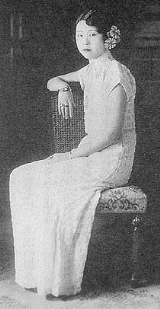
Tan Yuling
Encyclopedia
Tan Yuling was a concubine of the Emperor of Manchukuo
, Puyi
. Her name is sometimes transliterated into English as “Jade Years”.
of the Tatala clan, Yuling changed her Manchurian clan to a common Han
family name
"Tan" (谭) based on their similarity of pronunciation, due to anti-Manchuism in China
following the Xinhai Revolution
which overthrew the Manchu Qing dynasty. In 1927, while still a child, she entered the service of the Imperial Court, and she accompanied the Court to the Japanese
puppet state
of Manchukuo when it was founded in 1932.
On 6 April 1937, she was selected by Puyi as imperial concubine, and was granted the title of Imperial Concubine Xiang (祥貴人), which meant she was a consort of the Fifth Degree. She died six years after her marriage while being treated for typhoid fever
. Puyi felt that the death was suspicious, since she died shortly after an injection given by her Japanese doctor. Tan Yuling was known to have resented the Japanese control over the Emperor. Following her death, Puyi came under pressure from the Japanese Kwantung Army to select a Japanese as her replacement, but refused to do so.
After her death, Ta Yuling was elevated to the rank of guifei (‘Noble Concubine’, or Consort of the Second Degree, and was given the posthumous name
of "Mingxian" (明賢 ‘Brilliant-and-Virtuous’).
In 2004, the descendants of the Imperial Qing House further posthumously elevated her to the rank of Huang-guifei (皇貴妃 ‘Imperial Noble Consort’), or Consort of the First Degree.
Manchukuo
Manchukuo or Manshū-koku was a puppet state in Manchuria and eastern Inner Mongolia, governed under a form of constitutional monarchy. The region was the historical homeland of the Manchus, who founded the Qing Empire in China...
, Puyi
Puyi
Puyi , of the Manchu Aisin Gioro clan, was the last Emperor of China, and the twelfth and final ruler of the Qing Dynasty. He ruled as the Xuantong Emperor from 1908 until his abdication on 12 February 1912. From 1 to 12 July 1917 he was briefly restored to the throne as a nominal emperor by the...
. Her name is sometimes transliterated into English as “Jade Years”.
Biography
An ethnic ManchuManchu
The Manchu people or Man are an ethnic minority of China who originated in Manchuria . During their rise in the 17th century, with the help of the Ming dynasty rebels , they came to power in China and founded the Qing Dynasty, which ruled China until the Xinhai Revolution of 1911, which...
of the Tatala clan, Yuling changed her Manchurian clan to a common Han
Han Chinese
Han Chinese are an ethnic group native to China and are the largest single ethnic group in the world.Han Chinese constitute about 92% of the population of the People's Republic of China , 98% of the population of the Republic of China , 78% of the population of Singapore, and about 20% of the...
family name
Chinese surname
Chinese family names have been historically used by Han Chinese and Sinicized Chinese ethnic groups in mainland China, Taiwan, Hong Kong, and among overseas Chinese communities. In ancient times two types of surnames, family names and clan names , existed.The colloquial expressions laobaixing...
"Tan" (谭) based on their similarity of pronunciation, due to anti-Manchuism in China
China
Chinese civilization may refer to:* China for more general discussion of the country.* Chinese culture* Greater China, the transnational community of ethnic Chinese.* History of China* Sinosphere, the area historically affected by Chinese culture...
following the Xinhai Revolution
Xinhai Revolution
The Xinhai Revolution or Hsinhai Revolution, also known as Revolution of 1911 or the Chinese Revolution, was a revolution that overthrew China's last imperial dynasty, the Qing , and established the Republic of China...
which overthrew the Manchu Qing dynasty. In 1927, while still a child, she entered the service of the Imperial Court, and she accompanied the Court to the Japanese
Empire of Japan
The Empire of Japan is the name of the state of Japan that existed from the Meiji Restoration on 3 January 1868 to the enactment of the post-World War II Constitution of...
puppet state
Puppet state
A puppet state is a nominal sovereign of a state who is de facto controlled by a foreign power. The term refers to a government controlled by the government of another country like a puppeteer controls the strings of a marionette...
of Manchukuo when it was founded in 1932.
On 6 April 1937, she was selected by Puyi as imperial concubine, and was granted the title of Imperial Concubine Xiang (祥貴人), which meant she was a consort of the Fifth Degree. She died six years after her marriage while being treated for typhoid fever
Typhoid fever
Typhoid fever, also known as Typhoid, is a common worldwide bacterial disease, transmitted by the ingestion of food or water contaminated with the feces of an infected person, which contain the bacterium Salmonella enterica, serovar Typhi...
. Puyi felt that the death was suspicious, since she died shortly after an injection given by her Japanese doctor. Tan Yuling was known to have resented the Japanese control over the Emperor. Following her death, Puyi came under pressure from the Japanese Kwantung Army to select a Japanese as her replacement, but refused to do so.
After her death, Ta Yuling was elevated to the rank of guifei (‘Noble Concubine’, or Consort of the Second Degree, and was given the posthumous name
Posthumous name
A posthumous name is an honorary name given to royalty, nobles, and sometimes others, in East Asia after the person's death, and is used almost exclusively instead of one's personal name or other official titles during his life...
of "Mingxian" (明賢 ‘Brilliant-and-Virtuous’).
In 2004, the descendants of the Imperial Qing House further posthumously elevated her to the rank of Huang-guifei (皇貴妃 ‘Imperial Noble Consort’), or Consort of the First Degree.

